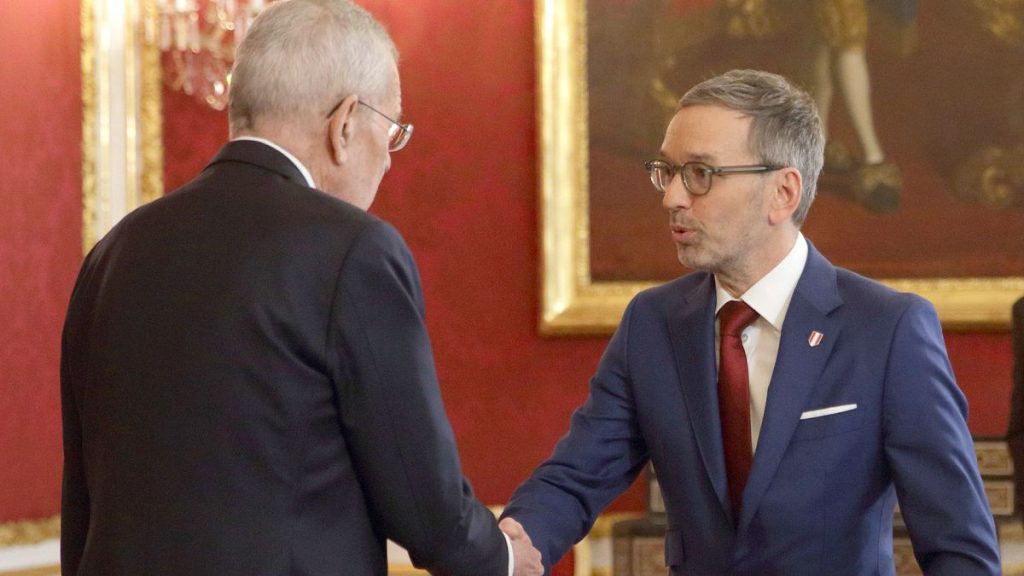Austria is potentially on the brink of having its first far-right-led government since World War II, with President Alexander Van der Bellen giving the green light to far-right Freedom Party (FPÖ) leader Herbert Kickl to attempt and form a new ruling coalition. Kickl’s party secured victory in Austria’s parliamentary elections in September, garnering 28.8% of the vote and surpassing outgoing Chancellor Karl Nehammer’s conservative Austrian People’s Party. Despite initial reluctance to work with the FPÖ, Nehammer’s resignation and a lack of viable alternative coalition options have opened the door to potential collaboration under Kickl’s leadership.
Efforts to create a governing alliance without the FPÖ failed by early January, leading to Nehammer’s resignation and the potential for the Austrian People’s Party to work with Kickl’s party. While talks between the two parties are ongoing, polls suggest that a new election could further strengthen the FPÖ’s position in Austria. The FPÖ’s election manifesto, titled “Fortress Austria,” advocates for strict border controls, the suspension of asylum rights, and the “remigration of uninvited foreigners” to create a more “homogeneous” society. The party also opposes sanctions against Russia, criticizes Western military support for Ukraine, and seeks Austria’s withdrawal from the European Sky Shield Initiative.
Austria has seen far-right and conservative coalitions in the past, with the FPÖ historically serving as a junior partner in government. The FPÖ previously governed in a coalition with the conservative Austrian People’s Party from 2017 to 2019, a partnership that ended in scandal under the FPÖ’s then-leader. Kickl, known for his provocative rhetoric, served as interior minister during that time and has frequently criticized Brussels “elites,” advocating for the return of certain powers from the EU to Austria. With the potential for a new far-right-led government in Austria, the country could see significant shifts in policies related to border control, immigration, and foreign relations.
President Van der Bellen’s approval of Kickl’s attempt to form a new ruling coalition marks a significant development in Austrian politics, potentially leading to the country’s first far-right-led government since World War II. While the FPÖ’s election manifesto and past actions may raise concerns for some Austrians and international observers, the party’s rising popularity and potential coalition with the Austrian People’s Party highlight a shift towards right-wing policies in the country. Any successful negotiations between the two parties could have far-reaching implications for Austria’s domestic and foreign policies, as well as its relationship with the European Union and neighboring countries.
The rise of the FPÖ and the potential for a far-right-led government in Austria raise questions about the country’s stance on immigration, border control, and foreign relations. Kickl’s leadership and the party’s manifesto suggest a strong emphasis on creating a more “homogeneous” society through strict immigration policies and a rejection of EU mandates. The FPÖ’s opposition to sanctions against Russia and criticism of Western military support for Ukraine could also impact Austria’s role in international affairs. As negotiations between the FPÖ and the Austrian People’s Party continue, the future direction of Austrian politics remains uncertain, with potential implications for the country’s standing in Europe and the global community.
The outcome of negotiations between the FPÖ and the Austrian People’s Party will have significant implications for Austria’s domestic and foreign policies, as well as its relationship with the European Union and neighboring countries. The potential for a far-right-led government in Austria marks a departure from recent political trends in the country and could signal a shift towards more right-wing policies. With the FPÖ’s rising popularity and emphasis on strict immigration controls and national sovereignty, Austria may be on the cusp of a significant political transformation. As discussions between the two parties progress, the international community will be closely watching to see how Austria’s political landscape evolves and how it may impact broader European dynamics.


